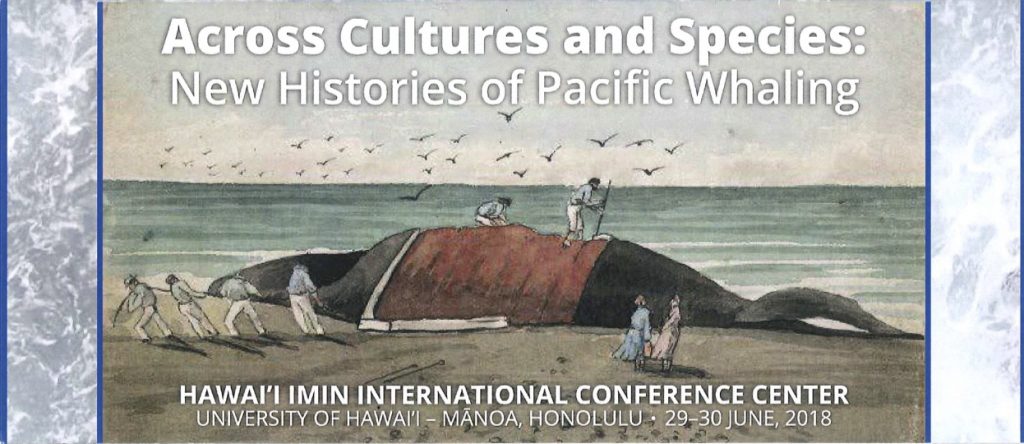Conference Report: Across Cultures and Species
In late June, the Centre co-sponsored a two-day pre-read workshop at Honolulu on new histories of pacific whaling. Participants were invited to think about animal-human interactions, as well as the intersection between environmental and cross-cultural histories. The workshop was led by Ryan Tucker Jones (University of Oregon) with support from Centre member, Angela Wanhalla, and generously supported by the Rachel Carson Center for Environment and Society.
The workshop opened with a paper by Susan Lebo (State Historic Preservation Office, Hawaii) that made a case for newspapers as integral, but overlooked, sources for revealing Hawaii’s whaling history, particularly Hawaiian-language newspapers, which feature Indigenous narratives. Lissa Wadewitz (Linfield College) examined the paradox of the violence involved in hunting and processing whales and their sometimes professed sentimentality for the animals, which she set within a context of a growing animal welfare movement in the United States. Vicki Luker (ANU) narrated the story of whaling in Fiji through the experiences of a chief and chiefly politics, while Adam Paterson (South Australia Maritime Museum) discussed a collaborative project on whalers and cross-cultural history at Encounter Bay, South Australia, emphasising Ngarrinderjeri perspectives about whales. Kate Stevens and Angela Wanhalla (University of Otago) took us to southern New Zealand where they used kinship as a framework of analysis to explore Kāi Tahu women’s participation in the shore whaling industry and their association with the sea. We concluded the first day with Nancy Shoemaker‘s (University of Connecticut) paper on the global trade in whale products and Akamine Jun‘s (Hitotsubashi University) interrogation of coastal whaling in Japan and how this shaped particular food cultures.
Day two opened with a session on Japan. Jakobina Arch (Whitman College) discussed the role of pelagic whaling in advancing Japan’s territorial expansion in the Pacific, while Noell Wilson (University of Mississippi) considered whaling cultures in the 19th century Hokkaido maritime region, focusing on the Ainu. In the second set of papers, Bathseba Demuth (Brown University) addressed capitalism in the early north pacific through the perspective of bowhead whales, inserting whale agency into human history. Jason Colby (Victoria) turned to the capture of grey whales for Seaworld in California, how this shaped scientific research and influenced human understanding of whales during an international movement focused on conservation and protection. The workshop closed with two papers that considered whaling and whales within contemporary Indigenous contexts. Jonathan Clapperton’s (Independent historian) paper addressed Puget Sound Salish Culture and legal claims to being whaling people, while Billie Lythberg (Auckland University) and Wayne Ngata (former Chair of the Māori Language Commission) told the story of Paikea, a whale and human ancestor, embodied by a tekoteko (carved human form) held by the American Natural History Museum in New York, who they hope to return home to his people. The workshop closed with a keynote address from Joshua L. Reid (University of Washington) at the Bishop Museum that centred Indigenous experience and perspectives at the heart of new histories of Pacific whaling.


